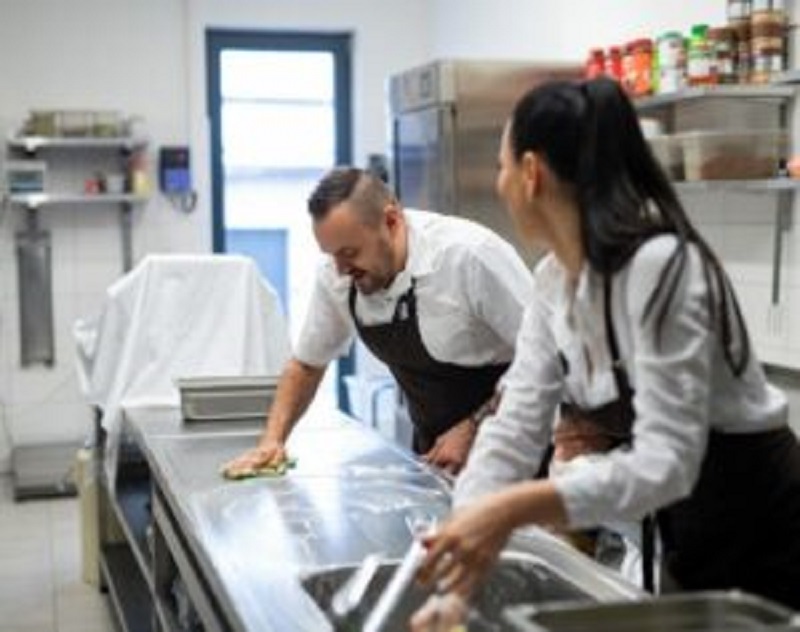Establish a Cleaning Schedule
A comprehensive cleaning schedule is the backbone of any clean kitchen. This schedule should outline daily, weekly, and monthly cleaning tasks. Daily tasks include sanitizing countertops, cleaning floors, washing dishes, and wiping down high-touch surfaces like door handles and light switches. Weekly tasks might involve deeper cleaning of ovens, grills, and refrigerators, while monthly tasks can include deep cleaning of walls, ceilings, and more thorough equipment maintenance. Adhering to this schedule ensures that no area is overlooked and that hygiene standards are consistently met.
Train Your Staff
Proper training is essential for maintaining a clean kitchen. Every staff member should be well-versed in cleaning protocols and understand the importance of their role in maintaining cleanliness. Regular training sessions can help reinforce these practices and keep everyone up-to-date with the latest hygiene standards and cleaning techniques. Additionally, Restaurant Kitchen Cleaning staff should be taught how to properly use and store cleaning products to ensure safety and effectiveness.
Use the Right Cleaning Products
Not all cleaning products are created equal. It's important to use products that are specifically designed for commercial kitchens. These products are often more effective at cutting through grease and sanitizing surfaces than household cleaners. Ensure that all cleaning agents used are food-safe and meet local health regulations. Always read the labels and follow the manufacturer’s instructions to prevent damage to surfaces and equipment.
Focus on High-Touch Areas
High-touch areas, such as refrigerator handles, oven knobs, and light switches, can harbor a significant amount of bacteria. These areas should be cleaned and sanitized multiple times throughout the day to prevent the spread of germs. Implementing this practice can greatly reduce the risk of contamination and foodborne illnesses.
Clean as You Go
The "clean as you go" policy is a fundamental practice in any busy kitchen. Encouraging staff to clean their workstations and equipment immediately after use helps maintain a clean environment and reduces the workload at the end of the shift. This practice also prevents the buildup of grime and grease, making deep cleaning tasks more manageable.
Regularly Inspect and Maintain Equipment
Kitchen equipment is a significant investment, and regular maintenance is essential to ensure its longevity and efficiency. Schedule regular inspections and servicing for all major appliances, such as ovens, refrigerators, and dishwashers. Cleaning filters, checking for wear and tear, and promptly addressing any issues can prevent breakdowns and costly repairs.
Ensure Proper Waste Management
Effective waste management is crucial in maintaining a clean kitchen. Ensure that garbage is regularly emptied and that waste bins are cleaned and sanitized to prevent odors and pests. Recycling practices should also be implemented to manage waste responsibly.
Keep Ventilation Systems Clean
Proper ventilation is essential in a commercial kitchen to remove smoke, steam, and odors. Regularly clean and maintain ventilation systems, including hoods and filters, to ensure they are functioning correctly. A clean ventilation system not only improves air quality but also reduces the risk of grease fires.
Conduct Regular Deep Cleaning
Despite daily cleaning efforts, regular deep cleaning is necessary to address areas that are often overlooked. This includes behind and under appliances, deep fryers, Steam Cleaning Services London and hard-to-reach corners. Hiring professional cleaning services for periodic deep cleaning can ensure that every nook and cranny is thoroughly sanitized.






Comments